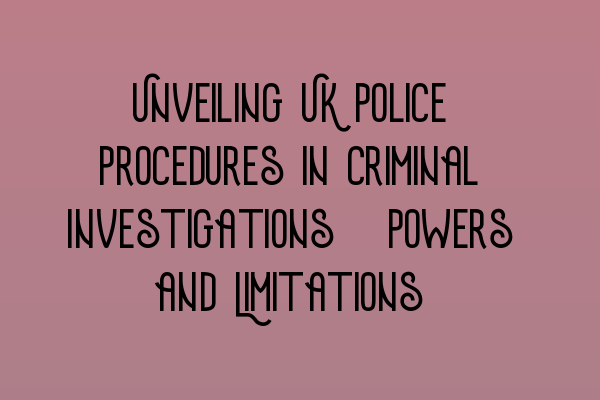Unveiling UK Police Procedures in Criminal Investigations: Powers and Limitations
When it comes to criminal investigations in the United Kingdom, the police play a crucial role in upholding the law and ensuring public safety. However, their powers and limitations are important factors to consider in order to maintain a fair and just legal system. In this article, we will delve into the various procedures that the UK police follow during criminal investigations, as well as explore the extent of their powers and the boundaries within which they must operate.
Arrest and Detention
One of the key powers granted to the police is the authority to arrest and detain individuals suspected of committing a criminal offense. Once a person is arrested, they can be held in custody for a certain period of time while the police gather evidence and conduct further investigations.
To ensure that the rights of the accused are protected, there are strict guidelines governing the arrest and detention process. These guidelines aim to prevent arbitrary arrests and uphold the principle of innocent until proven guilty. It is essential for the police to have reasonable grounds to believe that the person has committed an offense before making an arrest.
If you are preparing for the SQE 1 exam or seeking more practice materials, check out our practice exam questions designed to help you ace your exam.
Search and Seizure
Another important power bestowed upon the police is the ability to search premises and seize evidence relevant to a criminal investigation. This power is crucial in gathering evidence to support or refute allegations against a suspect.
However, the police must adhere to certain procedures and limitations when conducting searches. For example, they must obtain a search warrant from a magistrate or, in some cases, rely on specific statutory powers to conduct a search without a warrant.
If you want in-depth preparation for the SQE 1 mocks FLK1 and FLK2, our practice mocks can help you assess your knowledge and improve your performance.
Questioning and Interviews
During criminal investigations, the police have the authority to question individuals, including suspects, witnesses, and victims. These interviews are conducted to gather information and evidence that can be used in court.
However, it is important to note that the police must adhere to the rules set out in the Police and Criminal Evidence Act (PACE). PACE outlines the rights of individuals during police interviews, including the right to remain silent and the right to legal representation.
If you are preparing for the SQE 2 exam or seeking guidance and courses to enhance your knowledge, take a look at our comprehensive SQE 2 preparation courses.
Charging and Prosecution
Once the police have gathered sufficient evidence, they can make the decision to charge a suspect with a criminal offense. This decision is based on the evidence gathered during the investigation and the assessment of the Crown Prosecution Service (CPS) as to whether there is a realistic prospect of conviction.
If a suspect is charged, they will then face prosecution in court, where their guilt or innocence will be determined based on the evidence presented. It is important to note that the police do not have the power to convict individuals, as this is the role of the courts.
For those who are preparing for the SQE 1 exam, we offer comprehensive preparation courses to help you succeed in your legal career.
The Importance of Safeguards
The powers granted to the police during criminal investigations come with a great responsibility to ensure that these powers are not abused. To maintain a fair and just legal system, safeguards are in place to protect the rights of individuals and prevent any form of misconduct.
If you are curious about the upcoming SRA SQE exam dates or want to stay up to date with the latest information, visit our website for the most accurate and reliable information.
As aspiring legal professionals, it is crucial to have a deep understanding of the police procedures followed during criminal investigations. By being aware of their powers and limitations, we can contribute to the fair administration of justice and uphold the rights of all individuals involved in the criminal justice system.
In conclusion, the police in the UK play a vital role in criminal investigations, but they must operate within the boundaries of the law. Understanding their powers and limitations is essential to achieving justice and maintaining the integrity of the legal system.
